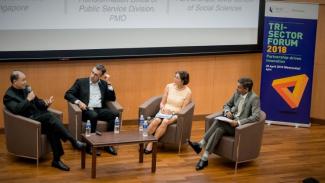
Adopting the theme "Partnership-driven innovation", the Tri-Sector Forum 2018 celebrated the innovative spirit that pursues both more sustainable approaches to the appropriation or exploitation of limited resources, as well as the collaborative exploration of novel sources of value.
The annual Forum in its fourth iteration again provided a venue for graduating senior and mid-career participants of the SMU Master of Tri-Sector Collaboration (MTSC) and leading practitioners to share their work and latest developments in the field.
Welcome remarks by Professor Tan Yoo Guan
In his opening remarks, Professor Tan Yoo Guan, Interim Dean of the School of Social Sciences said that alumni of the MTSC programme, together with leaders of partner organizations, now constitute an international network of next-generation leaders for a more sustainable and equitable future.
The alumni and students of the MTSC “come from South America, Canada, the Netherlands, Switzerland, the UK, South Africa, Hong Kong and member countries of ASEAN such as Indonesia, Myanmar, Thailand and the Philippines. The diversity of backgrounds, cultures, seniority and political systems enriches their perspectives. This diversity is an achievement we are proud of,” said Prof Tan.
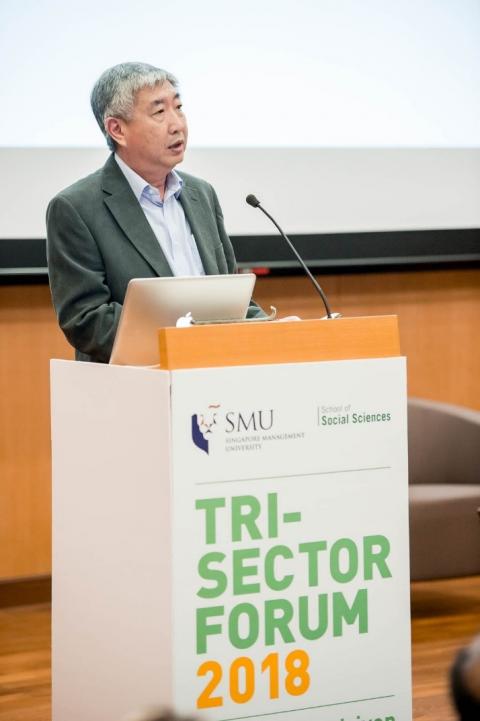
Professor Tan Yoo Guan, Interim Dean of the School of Social Sciences making his Opening Remarks.
In introducing SMU’s Vice Provost for Research, Professor Steven Miller to give his Opening Address, Prof Tan said, “Professor Miller is himself a seasoned ‘tri-sector athlete’ who has led many successful large-scale cross-sector collaborations. In his domain, this is referred to as the ‘triple-helix’ involving academia, technology companies and government agencies. His success has required the same adeptness for aligning collaborators across varying time horizons while finding common goals and complementary activities.”
Opening Address by Professor Steven Miller
Professor Miller commended the Tri-Sector magazine launched at the Forum as giving an excellent overview of what tri-sector collaboration means and what it is capable of achieving. He went on to explain why it fits with SMU’s identity. “As we project out to Singapore, ASEAN and the world, we will with increasing emphasis talk about taking our research and education and applying it to making a meaningful impact,” he said. He finished by encouraging those working in cross-sector collaborative initiatives, saying, “As exasperating and challenging as it can be to work the boundaries, don’t lose hope, don’t give up, because what you are doing is important.”
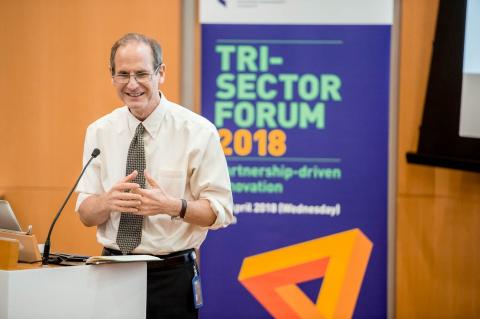
SMU’s Vice Provost for Research, Professor Steven Miller giving his Opening Address.
Panel discussion
This was followed by a Panel Discussion with Bruno Occhipinti, Director of Strategy and New Business Development for Phillips (APAC); Julie Rezler, Head, Corporate Engagement Centre, Save the Children, Singapore; and Alexander Lau, Principal Design Lead of the Innovation Lab, Transformation Office of the Public Service Division, Prime Minister's Office, Singapore.
Each outlined how their respective organisations are involved in cross-sector collaboration, explaining some of the challenges in involved but emphasising how this approach can produce profound advances in addressing some of the most entrenched social and development issues.
In answer to the panel moderator’s question “How is the practice of innovation (or design thinking) different in the context of multi-stakeholder partnerships compared to the more familiar context within a single organisation?”, Alexander Lau replied, “Design Thinking requires empathy – not just with the end-user or citizen but even with the people who deliver the services. What is required is to create a system that allows many solutions to happen.”
Bruno Occhipinti added that Innovation in such partnerships raises anxieties that include protection of intellectual property rights and whether every partner is contributing fairly. There would also be greater uncertainty about the momentum and commitment of organisations and key individuals. Leaders of such efforts, therefore require a lot of resilience and must be motivated to make a social impact.
Julie Rezler stressed how cross-sector partnerships help all parties to address challenges more effectively. "What we've found," she said, "is that when we innovate with partners, we're a lot more effective. The insights we bring around innovation come from our intimate knowledge of what is going to work in a low-resource setting."
MTSC student presentations
Rounding off the Forum were two succinct presentations by the 4th Cohort of Master of Tri-Sector Collaboration (MTSC) students. The first, From Aspiration to Impact: How corporations can use Cross-Sector Partnerships to achieve Sustainable Development Goals (SDGs) in the Region, focussed on how as corporations come under increasing pressure to be more sustainable, they can take steps internally and within their sectors to reconcile the differing expectations of activists, regulators, customers, employees and shareholders.
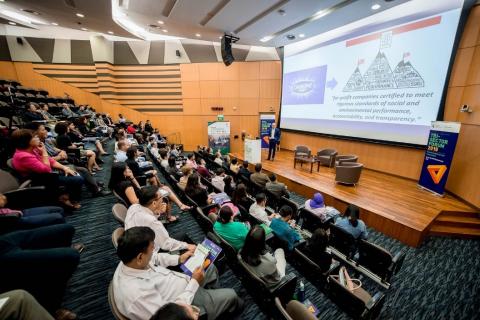
MTSC graduate, Mr Teymoor Nabili. highlights Danone’s recent B-Corporation accreditation during the capstone presentation on behalf of his team.
Although the UN SDGs provide a useful framework for facing the challenges and opportunities ahead, many companies still have problems identifying how to incorporate these goals into their strategies and practices. The presenters proposed that carefully constructed cross-sector partnerships offer an opportunity for corporations to achieve the SDGs, generate social capital and promote the interests of multiple stakeholders.
The second presentation, "Old but Gold" - Advancing Cross-Sector Partnerships to create "Inclusive Encore Careers" for Singapore’s Seniors in the year 2030, reminded the audience that in 2017, more than 14% of Singapore’s population was above the age of 65. By the year 2030, this will go up to 25% aged 65 years and older. Many of Singapore’s seniors will still be working, or seeking employment in a new era where automation, robots and artificial intelligence have reshaped or disrupted jobs.
This complex issue of a silver workforce presents enormous challenges for Singapore to maintain a vibrant economy and provide good jobs for its ageing citizens. In the rush towards technology, there is also increasing concern that current jobs and services might become inaccessible to seniors. The team proposed that cross-sector partnerships will become increasingly crucial to open up space and offer new opportunities to help this segment of seniors stay digitally engaged, active and employable, as well as to re-shape attitudes towards aging and the future of work.
The forum’s panel discussion and the students' presentations also addressed issues of inclusiveness and equity, as these are essential to the sustainability of our societies and systems.
The evening ended with the opportunity for the participants and audience to network and share their experiences with one another informally.
Watch the video
Read the Tri-Sector 2018 newsletter
See more photos
Main photo: The panel discussion with (L-R) Alexander Lau, Principal Design Lead of the Innovation Lab, Transformation Office of the Public Service Division, Prime Minister's Office, Singapore; Bruno Occhipinti, Director of Strategy and New Business Development for Phillips (APAC); Julie Rezler, Head, Corporate Engagement Centre, Save the Children, Singapore; and moderator Sriven Naidu, Director, Programme Development & Partnerships, Master of Tri-Sector Collaboration, School of Social Sciences.
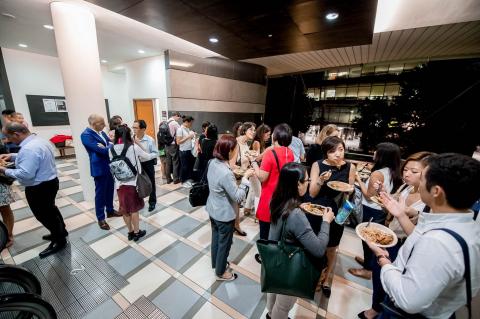
Forum participants and audience members networking and sharing their experiences during dinner.